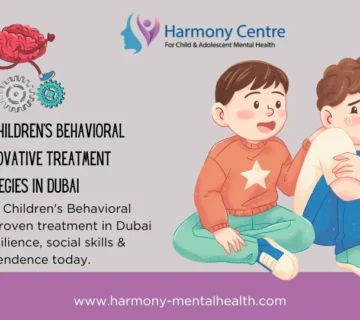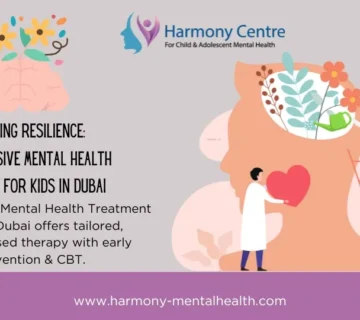Child Mental Health Support Network Dubai: Building a Robust Community for Resilient Families at Harmony Centre
Discover how to build a strong child mental health support network in Dubai at Harmony Centre. Learn community strategies, family support, and resources for lasting resilience.
Contact Information
| Contact Method | Details |
|---|---|
| Phone | +971 (52) 8773268 / 04 558 2015 |
| Click Here | |
| info@harmony-mentalhealth.com | |
| Address | Office 409, Building Alrazi-64C, 26th St, Healthcare City, Dubai |
Introduction
In Dubai’s bustling and diverse environment, the mental health of our children is a priority that extends far beyond the clinical setting. At Harmony Centre Mental Health Dubai, we believe that building a robust child mental health support network is essential for fostering resilience and ensuring every child thrives. Our integrated approach unites families, educators, mental health professionals, and community organizations to create a nurturing network that empowers every member.
A strong support network helps families share resources, exchange practical strategies, and provide mutual encouragement. It builds a safety net that reinforces positive mental health, improves social connections, and enhances overall well‑being. This article explores the critical role of support networks in child mental health, outlines effective strategies for building community connections, and explains how Harmony Centre leads the way in Dubai.
Visit Our Website • Contact Us
Understanding Child Mental Health Support Networks
What Is a Child Mental Health Support Network?
A child mental health support network is a collaborative system that connects families, educators, mental health professionals, and community resources to provide comprehensive support for children’s mental well‑being. This network focuses on:
- Emotional Support: Providing encouragement and understanding during challenging times.
- Resource Sharing: Offering access to educational materials, counseling services, and local mental health initiatives.
- Practical Strategies: Sharing effective techniques for managing stress, anxiety, and behavioral challenges.
- Community Engagement: Creating opportunities for families to connect, learn, and grow together.
Key Elements of an Effective Support Network
Family Involvement
Families are the cornerstone of any support network. A robust network encourages parents to:
- Share experiences and strategies.
- Participate in workshops and counseling.
- Build strong, supportive relationships with other families.
Professional Guidance
Mental health professionals provide expert advice and evidence‑based strategies that ensure interventions are effective and tailored to individual needs. This includes:
- Regular counseling sessions.
- Educational assessments.
- Therapeutic interventions such as Cognitive Behavioral Therapy (CBT) and play therapy.
Educational and Community Partnerships
Schools and community organizations play a vital role by:
- Implementing Social‑Emotional Learning (SEL) programs.
- Hosting support groups and seminars.
- Offering resources that bridge the gap between home and clinical care.
The Importance of a Support Network in Child Mental Health
Enhancing Resilience and Coping Skills
A strong support network reinforces the resilience of children by providing multiple layers of support. When families feel connected to a community that understands their challenges, children learn to cope better with stress and adversity. Benefits include:
- Improved Emotional Regulation: Consistent support helps children manage their emotions more effectively.
- Enhanced Social Skills: Peer interactions and group activities build communication skills and empathy.
- Reduced Isolation: Connecting with other families facing similar challenges alleviates feelings of loneliness and isolation.
Bridging the Gap Between Home and School
Support networks create a seamless connection between the home and school environments. This collaboration ensures that strategies learned in therapy are reinforced both at home and in the classroom. When parents and educators work together, children receive consistent messages that promote healthy behavior and academic success.
Promoting Early Intervention
By facilitating regular communication among families, schools, and mental health professionals, a strong support network encourages early identification of issues. Early intervention is crucial for preventing the escalation of mental health challenges and ensuring that children receive timely, effective support.
Building a Robust Support Network: Strategies for Success
Strengthening Family Bonds
Regular Family Meetings
Establish regular family meetings to discuss challenges, celebrate successes, and share feelings. Use a round‑robin format to ensure every family member has a chance to speak.
Active Listening
Practice active listening by encouraging family members to restate what they hear and validate each other’s emotions. This builds trust and reinforces positive communication.
Shared Activities
Engage in activities that bring the family together, such as cooking, game nights, or outdoor excursions. These shared experiences foster a sense of unity and belonging.
Collaborating with Educational Institutions
Teacher and Parent Collaboration
Work closely with educators to establish a consistent approach in both home and school settings. Regular meetings between parents and teachers help align strategies and support systems.
Integrated Support Plans
Develop Individualized Education Plans (IEPs) that incorporate recommendations from mental health professionals. These plans ensure that the child’s academic environment supports their emotional and behavioral needs.
School-Based SEL Programs
Encourage schools to implement Social‑Emotional Learning (SEL) programs that teach children vital skills like empathy, stress management, and effective communication. These programs enhance the overall mental well‑being of students.
Engaging with Community Resources
Parent Support Groups
Join local support groups where you can share experiences, exchange practical advice, and build a network of trusted peers. These groups provide a safe space for discussing challenges and celebrating successes.
Community Workshops and Seminars
Attend community workshops and seminars on mental health topics. These events offer valuable insights and practical tools to enhance family resilience and build effective support networks.
Digital and Telehealth Platforms
Leverage online forums and telehealth services to connect with mental health professionals and other families. Digital tools provide continuous support and make it easier to access resources, regardless of your busy schedule.
Evidence‑Based Benefits of a Support Network
Measurable Improvements in Child Outcomes
Research shows that children who benefit from a robust support network exhibit:
- Enhanced Academic Performance: Improved focus and reduced behavioral issues lead to better grades.
- Improved Emotional Regulation: Consistent support helps children manage anxiety, depression, and other emotional challenges.
- Stronger Social Skills: Positive peer interactions foster better communication and collaboration among children.
Real‑World Success Stories
Families who have integrated support networks into their lives report transformative improvements. For example, one parent noted that regular participation in a local support group not only helped their child overcome feelings of isolation but also boosted the child’s self‑confidence and academic performance. These success stories underline the powerful impact of community support.
“Connecting with other families has been a game‑changer. Our child feels more understood, and the shared strategies have truly made a difference in our daily lives.”
– Parent Testimonial
Practical Strategies for Implementing a Support Network
For Families
Establish Clear Routines
Develop daily schedules that include time for therapy, school, and leisure. Visual aids like calendars and checklists can help maintain structure and reduce stress.
Foster Open Communication
Engage in regular discussions about emotions, experiences, and challenges. Encourage every family member to share their thoughts and listen actively.
Participate in Support Groups
Join local parent support groups and community forums to exchange ideas and build lasting connections. These groups offer valuable insights and emotional support.
For Educators
Integrate SEL into Classrooms
Implement Social‑Emotional Learning (SEL) programs to help students build essential life skills. SEL curricula foster empathy, stress management, and effective communication.
Collaborate with Parents and Mental Health Professionals
Maintain open channels of communication between school staff, parents, and mental health experts. This collaboration ensures that strategies are consistently applied across all environments.
Provide a Structured Learning Environment
Create classroom routines that minimize distractions and encourage active learning. Designate calm spaces for students to take breaks and manage stress.
For the Community
Engage in Community Programs
Participate in workshops, seminars, and mental health awareness campaigns. These initiatives provide practical tools and foster a supportive environment for families.
Utilize Digital Platforms
Leverage telehealth services and online resources to maintain continuous support. Digital tools help connect families with expert guidance and community networks.
Advocate for Mental Health Awareness
Promote public awareness campaigns that educate the community on the importance of mental health support networks. A well‑informed community contributes to a stronger, more resilient support system.
Contact Information
For more details or to join our support network, please reach out to Harmony Centre Mental Health Dubai:
Office Address:
Office 409, Building Alrazi-64C, 26th St, Umm Hurair 2, Dubai Healthcare City, Dubai
Phone:
+971 4 558 2015
+971 5 287 73268
Email:
info@harmony-mentalhealth.com
Frequently Asked Questions about Child Mental Health Support Network Dubai
Book a Consultation Now
Final Thoughts about Child Mental Health Support Network Dubai
A strong child mental health support network is the backbone of resilient families. In Dubai’s vibrant and challenging environment, creating a community that offers emotional support, practical strategies, and continuous guidance is essential for lasting mental well‑being. At Harmony Centre Mental Health Dubai, our integrated approach brings together families, educators, and professionals to build a nurturing, supportive network that empowers every child to thrive.
Our evidence‑based methods, personalized care, and commitment to continuous improvement make us the trusted leader in mental health care. By embracing the power of community, you invest in a brighter, healthier future for your child and your family.
Learn More About Harmony Centre
Get in Touch
👉 Book a Consultation Now: Call +971 4 558 2015 or visit www.harmony-mentalhealth.com.
Join our online community and stay updated with our latest events, articles about Child Mental Health Support Network Dubai



